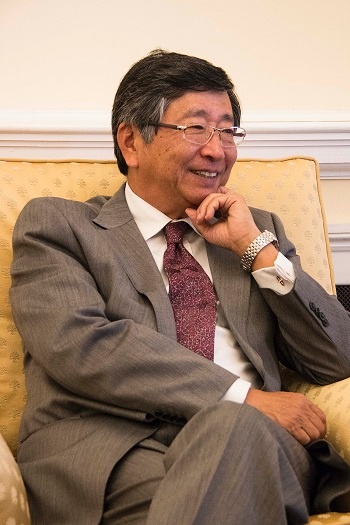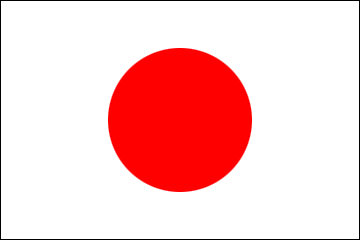Spotlight on: Ambassador Koji Tsuruoka
This month, we put the spotlight on Mr Koji Tsuruoka, who took up his post as Ambassador of Japan to the UK on 6 June 2016.
 Can you tell us something about your early life?
Can you tell us something about your early life?
My father was a diplomat. At first he worked at the Headquarters in Tokyo, then we lived abroad in Italy, Sweden and the United States. When my father was Ambassador to the United Nations, I went to a private high school in New York, which gave me useful exposure to English.
As for university, I went to University of Tokyo to do Law. That’s a very ordinary path for government officials in Japan. Then after joining the diplomatic service I was sent to Harvard Law School to undertake graduate studies.
I presume your English is so excellent because of the time you spent abroad when you were younger?
That must have helped. But since you ask about language, one thing I have noticed is that I have been exposed to a number of different types of English. I have participated in a number of international conferences, and I was a regular attendee at UN meetings, both in Geneva and New York. Also in Asia, we now have a number of international meetings, for instance with ASEAN and India, so my exposure to different types of English has been very frequent and very extensive. Maybe these experiences have helped me to acquire a version of English that has no particular nationality.
Why did you join the Foreign Ministry?
I thought I might enjoy doing some work for international cooperation, promoting international understanding. Perhaps the most important reason was I thought I might be useful in helping to ensure we did not have another war. I thought that if I could be of any use in that area, it would be the most important thing I could do. From quite an early age, I never considered anything other than joining the foreign service.
What would you regard as some of the highlights of your career so far?
I have spent most of my time in Tokyo. My latest assignment was to lead the government team for the Trans-Pacific Partnership (TPP) negotiations. This involved 12 countries in the Asia-Pacific. The negotiations were very comprehensive, covering a very wide area, not limited to issues like trade or intellectual property but including the environment and labour. They were very lengthy and difficult, and very high-profile politically. I performed this role for about three years, just prior to my coming to London.
Before that, I was also the personal representative of the Prime Minister to the G8 and G20 meetings. Such people are usually called sherpas because they are supposed to support their leaders in climbing to the summit. And before that I was Deputy Vice Minister in charge of foreign policy. In that position I was responsible for coordinating the overall diplomatic policies of Japan. So it has been very much a policy-oriented career. When you ask about the “highlights” of my career, it is difficult to say what they are. For instance, I did work on the International Criminal Court and negotiated some of the articles in the Services Agreement during the Uruguay Round.
As for my overseas service, my most recent assignment before coming to London was in Indonesia, and before that I was in Washington D.C. and Moscow in the days of the Soviet Union. So I have had exposure to different parts of the world. And during my career at the Headquarters, I was assigned to UN-related work as well as working on climate change and global issues.
One of the important principles that I have been trying to promote and on which I have based my approach in diplomacy is what we call human security. This is not necessarily a widely-known concept. In a nutshell, human security is an approach that makes it possible for individuals to fully deploy their capacity. How you can make that happen is the role of the state and institutions to fulfil. For example, people are sometimes prevented from pursuing their natural inclinations such as creating art or engaging in business because of circumstances beyond their control like wars and contagious diseases. So the aim of human security is to allow people to fully deploy their talents. This is not necessarily the traditional function of diplomacy, but because globalisation is bringing borders down, states have to understand that many transnational issues require full participation among different countries, and we need to cooperate for a common cause, a common objective, that will be of benefit to everyone concerned, not just for a short time but from a longer-term perspective as well. I like to think I have made a contribution to furthering the cause of human security.
Now you’re in London, what are your general aims here?
Well, first of all, I’ve been in the foreign service for more than 40 years, and I think it’s about time I myself enjoyed life, but more than that, my wife should be allowed to enjoy her own life. She had to put up with my endless foreign trips while she was in Tokyo. As we only lived in three foreign capitals, compared to a number of my friends who spent many years abroad, she spent most of her time in Tokyo. And now the opportunity is here for both of us to immerse ourselves in this centre of civilisation. We have access to art, music, theatre, the list is endless, all of top, global quality. There is no limit to high culture and intellectual stimulation in London, and we are determined to enjoy these things.
But professionally, I don’t think my Prime Minister and my Emperor have sent me to London just to relax during the few last years of my diplomatic career! When one looks at the sweep of history, one can observe that the world is a better place now that the Cold War is over, but we cannot say confidently that tomorrow will be better than today. And it is very important for countries that can understand the salient issues to take action aimed at forging a better future. All of us need to join forces, and I think the UK and Japan are two countries ideally placed to do that. I should add that, although this is my first assignment to the UK, I have been here many times before. For instance, I was working with Prime Minister Abe at the Lough Erne G8 Summit chaired by PM David Cameron.
Are there any places in the UK that you would particularly like to visit?
Because I’ve been here a number of times, I think I’ve been to most of the famous ‘must-sees’, like Westminster Abbey and Buckingham Palace, and I will probably be visiting those places in an official capacity. My wife and I have already been to Kew Gardens and are looking forward to driving out of London and visiting the beautiful landscape as well as castles, mansions and the suchlike.
Actually, if my Prime Minister thought he was rewarding me by appointing me here, it may be based on his knowledge that I am a keen golfer. Of course, golf originates from Scotland. I’ve never been to Scotland and am very much looking forward to going there to see what it’s like to play at St Andrews, the jewel in the crown of golf. Perhaps my Prime Minister thought I could not end my career without going there!
